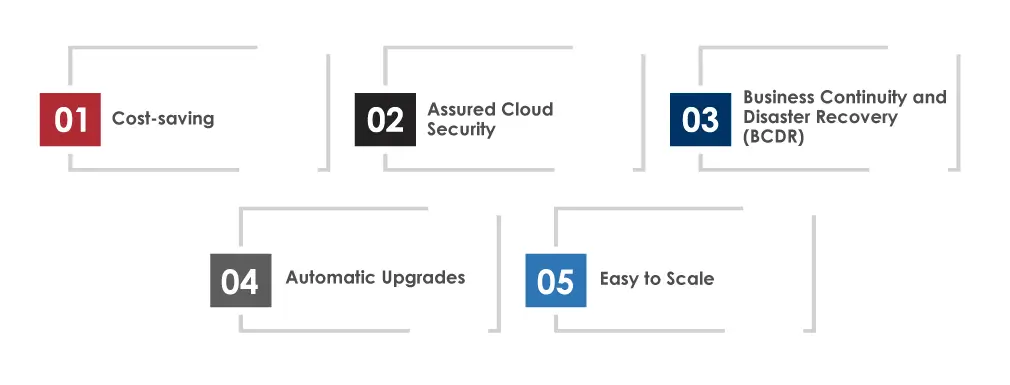- Cloud-Managed Services: A Brief Overview
- Role of Cloud-Managed Services for Businesses
- Top 5 Business Benefits of Leveraging Cloud-Managed Services
- Best Practices to Implement Cloud-Managed Services
- How can Tx Assist with Cloud Security Managed Services?
- Summary
As the tech landscape changes, businesses must accelerate their digital transformation strategies to deliver measurable benefits for their target audience. The problem is that most companies lack IT capabilities, resources, or time to balance their business requirements with technology needs. Traditional IT infrastructures are costly to maintain as they drain resources much faster, hinder innovation, and make companies vulnerable to security risks. Â
The question is, “How can organizations tackle such issues in the modern business environment?†The answer lies in cloud-managed services, a more intelligent and innovative way to streamline critical IT processes and seamlessly handle key business applications. It can assist in simplifying processes and workflows while reducing costs and focusing on key business strategies. If businesses want to succeed in the digital age, viewing cloud-managed services as a strategic need is necessary.Â
Cloud-Managed Services: A Brief Overview

Cloud-managed services, or managed cloud, is an ecosystem, service, or application managed by third-party organizations in the cloud. It includes various IT tasks such as help desk support, operations management, engineering on-demand, cost optimization, performance management, financial management, and security and compliance governance. These services involve partial or complete control and management of an enterprise cloud platform including cloud management, deployment, maintenance, optimization, and migration. Â
Role of Cloud-Managed Services for Businesses

Modern enterprises need cloud-managed services to support technological innovation, development, and effectiveness. These services act as an intermediate between businesses and the cloud, covering various processes like resource optimization and supply, security, and cost management. According to research, the cloud-managed services global market will increase at a CAGR of 13.6% from 2023 to 2030. Â
By redirecting cloud management security to professionals like MSP (managed service providers) businesses can better utilize their internal resources for core operations. It will also offer a strong security control and compliance layer, which will help them protect their sensitive data from cyber threats. Managed cloud services can also streamline operations and make it easier to implement agile solutions to meet the requirements of modern businesses. According to statistics, 87% of businesses have already employed MSPs or plan to do so. It is not shocking considering the expense of managing in-house cloud teams and the rising demand for cloud-managed services.Â
Top 5 Business Benefits of Leveraging Cloud-Managed Services

In today’s dynamic business environment, managed cloud services are a strategic necessity for businesses. These services offer a variety of benefits to allow businesses to streamline their processes, optimize security, and save operational costs. Let’s take a quick look at some of the benefits of cloud-managed services:Â
Cost-saving
Businesses can have access to tools and resources when they actually need them, which is the best way to enable cost savings. By investing in cloud-managed services, companies no longer have to spend time, money, or other resources in hiring an in-house expert IT resource, and then training them to reduce churn. Also, they can negate upfront investments and streamline monthly operational bills by opting for a pay-per-use model.Â
Assured Cloud Security
Partnering with cloud-managed service providers provides companies with next-gen cybersecurity support to protect sensitive information/operations from attacks. The service provider will use their knowledge to strengthen IT infrastructure to minimize the risks of leaking sensitive data to cybercriminals. They will implement necessary security controls (encryption, multi-factor authentication, antivirus software, etc.) to upscale business security and enhance attack detection and mitigation processes.Â
Business Continuity and Disaster Recovery (BCDR)
A few years ago, the pandemic opened the eyes of everyone to the fact that an unexpected event can bring any business to a standstill. With cloud-managed services, businesses can stay operational despite any disaster (natural and man-made), server crash, or hacking attempts. Businesses can take regular backups of their data onto the cloud and safeguard it while ensuring business continuity.Â
Automatic Upgrades
It is a given fact that any infrastructure can become outdated if frequent updates aren’t performed. Cloud infrastructure receives frequent upgrades, which makes it difficult to maintain and upgrade IT systems in-house. Managed cloud infrastructure, on the other hand, assures businesses with up-to-date infrastructure and recent security patches when needed. The automatic upgrades promote innovation, improve server security, and mitigate downtime issues.Â
Easy to Scale
Cloud-managed services are highly scalable and allow businesses to meet the rising demand for digital services and products, irrespective of the time of day or season of the year. The cloud-managed service provider will manage the storage and compute resources’ scalability while businesses can ignore issues like slow rollouts, costly infrastructure management, limited spaces, etc.Â
Best Practices to Implement Cloud-Managed Services

Cloud-managed services implementation demands a systematic approach for smooth integration and maximum performance. Following are some of the best practices that businesses should follow:Â
- A Cloud Center of Excellence is a must, which will consist of individuals expert in cloud computing, security, operations, and architecture. They will be responsible for handling cloud implementation best practices, strategy, and governance.Â
- Cloud implementation involves tech advancements and changing the way business operates. They must analyze how it will affect current processes, workflows, compliances, security, data management, and overall organizational structure.Â
- Encourage staff to adopt cloud technology and provide them with training and resources to hone their skills. Â
- Plan the cloud migration of apps, data, and work processes in multiple phases. Start with non-critical data or simple apps, then make your way towards mission-critical systems.Â
- Implement cost management practices by analyzing resource utilization and areas of cost savings, leveraging auto-scaling, and deploying cost-tracking tools and a pay-as-you-go model, to maximize ROI on cloud spending. Â
- Utilize an effective cloud data management strategy to store, organize, and protect cloud data. It will cover data backup, encryption, recovery, and privacy laws to ensure the integrity and availability of cloud data.Â
- Combine both cloud and on-premises resources to run an integrated and seamless IT ecosystem and leverage maximum scalability, cost-effectiveness, and performance.
How can Tx Assist with Cloud Managed Services Implementation?

Being one of the leading digital assurance and quality engineering companies, Tx can assist with cloud migration and management, and cloud security testing to help you identify, manage, and reduce risks in your cloud environments. Our comprehensive solutions are tailored to fit your specific business requirements and ensure robust security and compliance with industry standards. Our expertise allows our clients to capitalize on the benefits of microservices architecture, supporting rapid DevOps deployment, development, and updates.Â
We offer round-the-clock support to assist you in resolving issues swiftly and streamlining cloud operations, be it monitoring or root cause analysis. Our expert team leverages advanced tools and methodologies to validate the security, functionality, and performance of your business apps before any underlying risk impacts the end user. Partnering with us will ensure:Â
- Enhanced security and compliance assuranceÂ
- Business continuity, data protection, and disaster recoveryÂ
- Optimal resource utilization, futureproofing, and scalabilityÂ
- Continuous integration, enhanced efficiency, and improved accuracyÂ
Summary
Businesses are increasingly shifting to cloud-managed services to accelerate digital transformation, streamline IT operations, and enhance cost efficiency. Traditional IT infrastructures are costly and resource-intensive, often hindering innovation and making businesses vulnerable to security risks. Cloud-managed services, handled by third-party providers, offer a strategic solution to optimize processes, improve security, and scale operations. Key benefits include cost savings, enhanced cybersecurity, disaster recovery, automatic updates, and scalability. Implementing these services requires best practices such as establishing a Cloud Center of Excellence, phased cloud migration, and efficient cost management. By partnering with Tx, businesses can ensure secure, scalable cloud environments while maintaining compliance and maximizing performance. To know how Tx can help, contact our experts now.Â
The post Why Businesses Should Shift to Cloud Managed Services  first appeared on TestingXperts.
Source: Read More



